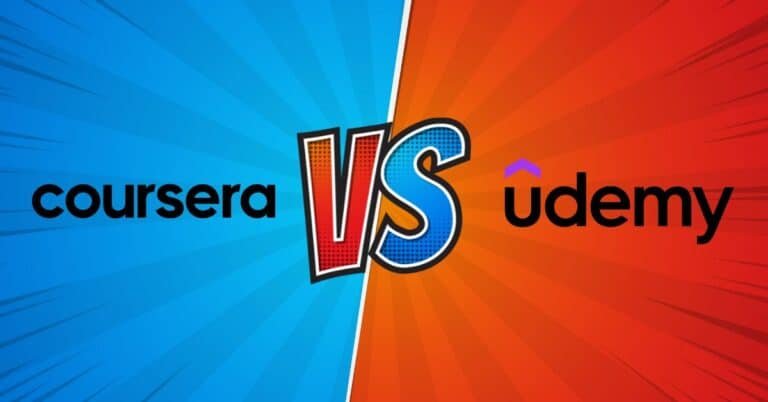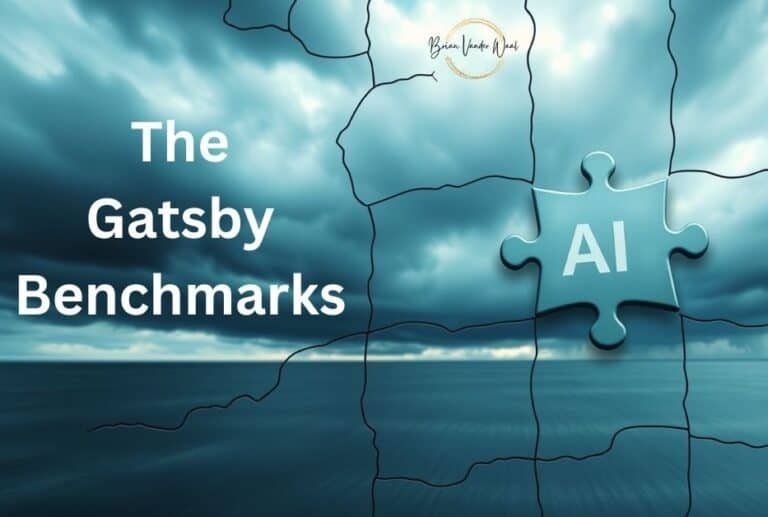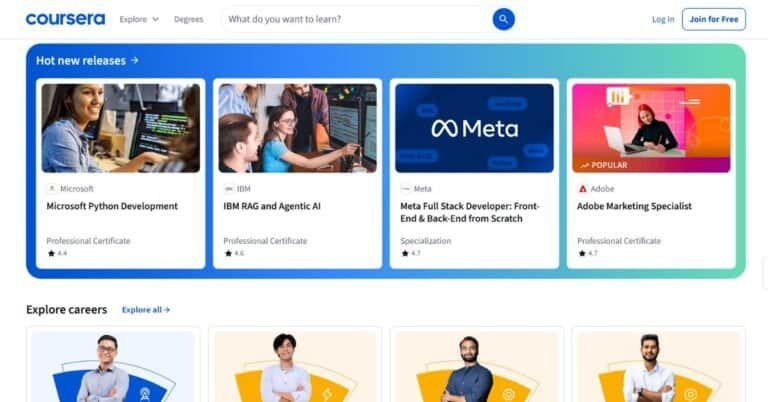Disclosure: brianvanderwaal.com is supported by our users. Some of the links in this article may be affiliate links, which can compensate me at no cost to you if you decide to make a purchase.
Are you looking for the best TensorFlow course to learn online in 2026? If so, you have come to the right place.
TensorFlow is an end-to-end open-source platform for machine learning. It has a comprehensive, flexible ecosystem of tools, libraries, and community resources that lets researchers push the state-of-the-art in Machine Learning, and developers easily build and deploy Machine Learning powered applications.
TensorFlow is commonly used for machine learning applications such as voice recognition and detection, Google Translate, image recognition, and natural language processing. It is a popular open-source machine learning framework to train a neural network for computer vision applications.
You can learn TensorFlow through online courses, but many of them are not worth your time. I have researched and outlined below my complete guide to the best TensorFlow course to meet your needs based on level, course type and more! Find out the best courses for learning TensorFlow or for achieving TensorFlow certification.
What is the Best TensorFlow course?
1. Deep Learning.AI TensorFlow Developer Professional Certificate
Best TensorFlow Course for Achieving a Professional Certificate
Level: Intermediate
With a rating of 4.7/5 and 330,000 students of this online course, it is my top pick for best TensorFlow course for achieving a Professional Certificate. It is a great place to start to master foundational basics.
The Deep Learning.AI TensorFlow Developer Professional Certificate program offered by coursera teaches you applied machine learning skills with TensorFlow so you can build and train powerful models. You will learn about deep networks and how to build deep learning models.
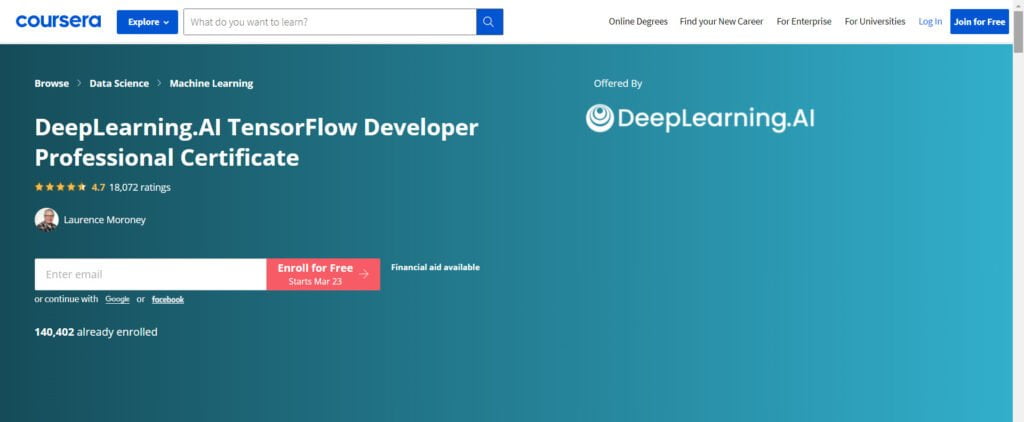
In this TensorFlow Developer Certificate, you will learn:
- Best practices for TensorFlow
- How to handle real-world image data and explore strategies to prevent overfitting, including augmentation and dropout.
- How to build natural language processing systems using TensorFlow.
- How to apply Recurrent Neural Networks (RNNs), Gated Recurrent Units (GRUs), and Long Short-Term Memory Cells (LSTMs) as you train them using text repositories.
- How to build and train neural networks using TensorFlow
- How to improve your network’s performance using convolutions as you train it to identify real-world images
- How to teach machines to understand, analyze, and respond to human speech with natural language processing systems
- How to process text, represent sentences as vectors, and train a model to create original poetry!
This is a hands-on course containing four courses in this Professional Certificate, which includes:
- Introduction to TensorFlow for Artificial Intelligence, Machine Learning, and Deep Learning
- Convolutional Neural Networks in TensorFlow
- Natural Language Processing in TensorFlow
- Sequences, Time Series and Prediction
Pros:
- Earn a shareable certificate upon completion
- The course is 100% online and you can start instantly and learn at your own pace.
- You can learn flexibly in accordance with the time you have. For example, if you are working full time, you have the flexibility to work around that in the time you have. You can set and maintain flexible deadlines.
- The course is taught in English, there are subtitles available for Arabic, French, Portuguese (European), Italian, Vietnamese, German, Russian, Turkish, Spanish, Japanese, Korean and English.
- You’ll get hands-on experience through 16 Python programming assignments.
- You’ll learn the necessary tools to build scalable AI-powered applications with TensorFlow.
- After finishing this course, you’ll be able to apply your new TensorFlow skills to a wide range of problems and projects.
- This program can help you prepare for the Google TensorFlow Certificate exam
- It takes approximately 4 months to complete at a suggested pace of 5 hours/week, which will be manageable for most people.
Cons:
- You can’t click on the reviews to read them
- Some people might prefer more depth. If so, you could consider one of the advanced courses mentioned in this article.
Note: It is Intermediate Level and some related experience is required, so if you are a complete beginner, then one of the other courses I am recommending below may be more suitable.
I highly recommend this course as one of the best TensorFlow courses and you can enroll for free and then pay when you’re ready to start the course.
2. TensorFlow: Advanced Techniques Specialization
Best TensorFlow Course for Specialization
Level: Intermediate
With a rating of 4.8/5 and 27,000 students of this course, it is my top pick for best TensorFlow Specialization course.
The TensorFlow: Advanced Techniques Specialization offered by coursera will help you to expand your skill set and master TensorFlow. You will learn to customize your machine learning models through four hands-on courses.
This Specialization is for software and machine learning engineers with a foundational understanding of TensorFlow who are looking to expand their knowledge and skill set by learning advanced TensorFlow features to build powerful models.
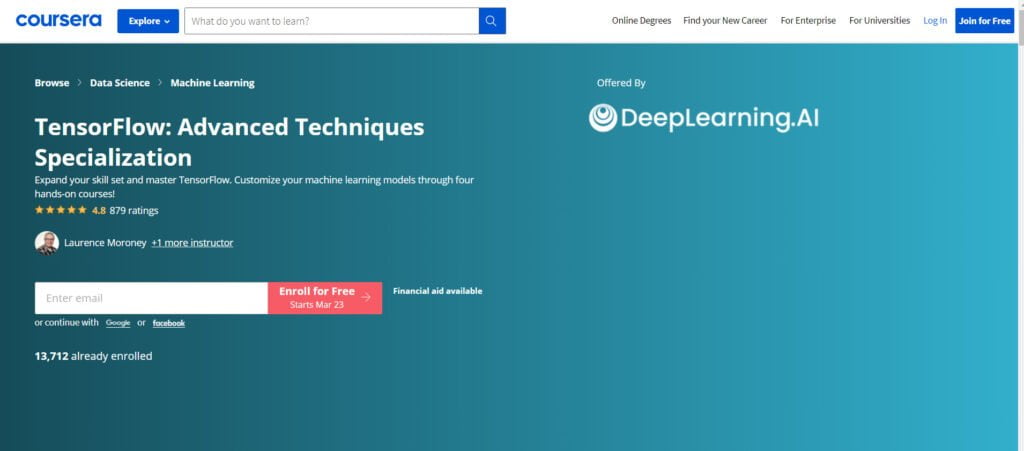
In this Advanced Specialization training course, you will learn:
- The underlying basis of the Functional API and build exotic non-sequential model types, custom loss functions, and layers.
- Optimization and how to use GradientTape and Autograph
- To optimize training in different environments with multiple processors and chip types.
- Through practising object detection, image segmentation, and visual interpretation of convolutions.
- Through exploring generative deep learning, and how artificial intelligence can create new content, from Style Transfer through Auto Encoding and Variational Autoencoder (VAE) to Generative Adversarial Network (GAN).
This is a hands-on TensorFlow training containing four courses in this Specialization, which include:
- Custom Models, Layers, and Loss Functions with TensorFlow
- Custom and Distributed Training with TensorFlow
- Advanced Computer Vision with TensorFlow
- Generative Deep Learning with TensorFlow
Pros:
- Earn a shareable certificate upon completion
- The course is 100% online and you can start instantly and learn at your own pace.
- You can learn flexibly in accordance with the time you have. You can set and maintain flexible deadlines.
- It has a very well-structured curriculum
- Clear and informative explanations are given
- It takes approximately 5 months to complete at a suggested pace of 7 hours/week, which will be manageable for most people.
Cons:
- You can’t click on the reviews to read them
- The course is taught in English and unlike some of the other courses mentioned in this article, subtitles are only in English as well and not in any other language. So that limits this course to English speakers.
Note: It is Intermediate Level and some related experience is required. Prerequisites for this course are basic calculus, linear algebra, stats, knowledge of artificial intelligence, deep learning, experience with Python, TF / Keras / PyTorch framework, decorator, context manager.
This specialization gets my recommendation as one of the best TensorFlow courses and you can enroll for free and then pay when you’re ready to start the course.
3. Advanced Machine Learning on Google Cloud Specialization
Best TensorFlow Course on Google Cloud Specialization
Level: Advanced
With a rating of 4.5/5 and 69,000 students of this course, it is my top pick for best TensorFlow course on Google Cloud specialization.
The Advanced Machine Learning on Google Cloud Specialization offered by coursera will help you to learn how to build production-ready machine learning models with TensorFlow on Google Cloud Platform. It is an advanced Machine Learning course with Google Cloud, provided by Google AI.
This Google Cloud Platform Specialization with 5 courses focuses on advanced machine learning topics using Google Cloud Platform where you will get hands-on experience optimizing, deploying, and scaling production ML models of various types in hands-on labs.
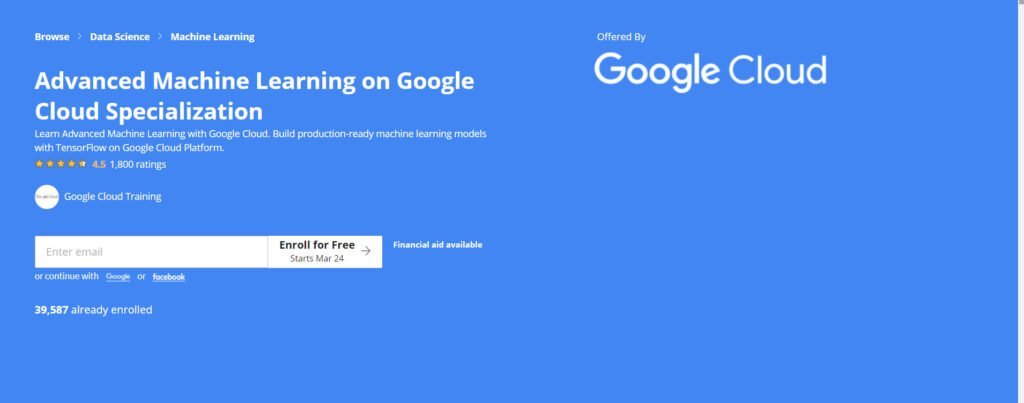
In this online course, you will learn:
- How to build scalable, accurate, and production-ready models for structured data, image data, time-series, and natural language text. It ends with a course on building recommendation systems.
- How to compare static vs. dynamic training and inference
- How to manage model dependencies
- How to set up distributed training for fault tolerance, replication, and more
- How to export models for portability
This is a hands-on TensorFlow training containing 5 courses in this Specialization, which include:
- End-to-End Machine Learning with TensorFlow on GCP
- Production Machine Learning Systems
- Image Understanding with TensorFlow on GCP
- Sequence Models for Time Series and Natural Language Processing
- Recommendation Systems with TensorFlow on GCP
Pros:
- You will gain practical hands-on experience with the concepts explained throughout the modules.
- This specialization incorporates hands-on labs using the Qwiklabs platform
- These hands-on components will let you apply the skills you learn in the video lectures.
- Projects will incorporate topics such as Google Cloud Platform products, which are used and configured within Qwiklabs.
- Earn a certificate upon completion
- The course is 100% online and you can start instantly and learn at your own schedule.
- You can learn flexibly in accordance with the time you have. You can set and maintain flexible deadlines.
- Very well-structured curriculum
- Clear and informative explanations are given
- It takes approximately 3 months to complete at a suggested pace of 5 hours/week, which will be manageable for most people.
- Whilst the course is taught in English, there are subtitles available for French, Portuguese (European), Russian, Spanish, and English
Cons:
- You can’t click on the reviews to read them
- Most people would strongly benefit from completing the Machine Learning on GCP course first, as this is a recommended pre-requisite for the course. So you may want to consider doing Machine Learning on GCP first, unless you already have the relevant knowledge.
Note: It is and Advanced level course and designed only for those already in the industry, so you can consider one of the intermediate or beginner courses mentioned in this article if you don’t currently meet these requirements.
I highly recommend this Google Cloud platform specialization as one of the best TensorFlow courses as you will develop your skills in building production-ready machine learning models with TensorFlow on Google Cloud Platform. Better yet, you can enroll for free and then pay when you’re ready to start the course.
4. Deep Learning Specialization
Best Foundational Deep Learning Course Which Incorporates Training in TensorFlow
Level: Intermediate
With a rating of 4.9/5 and a stunning 1.2 million students of this course, it is my top pick for best foundational deep learning course which incorporates training in TensorFlow.
The Deep Learning Specialization offered by coursera will help you to become a machine learning expert, master the fundamentals of deep learning and break into artificial intelligence.
This specialization made up of 5 courses is a foundational program that will help you understand the capabilities, challenges, and consequences of deep learning and prepare you to participate in the development of leading-edge artificial intelligence technology. This online course will take approximately 5 months to complete at a suggested pace of 8 hours/week.
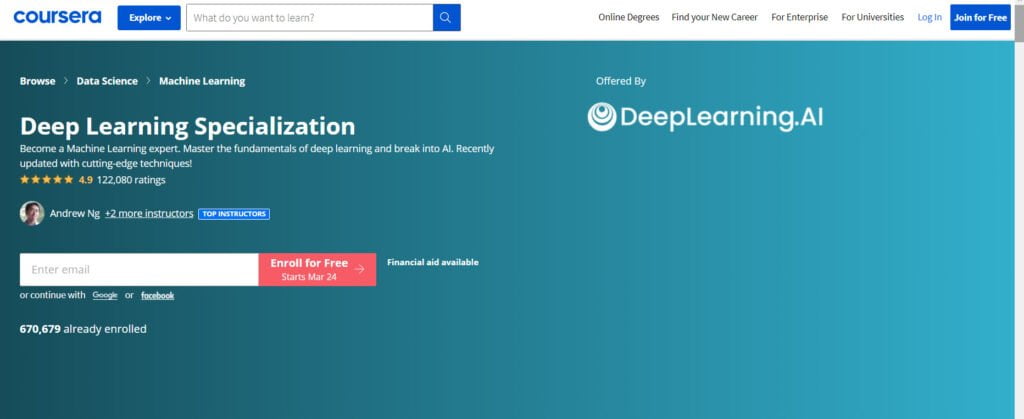
In this TensorFlow Specialization Training course you will learn:
- How to build and train neural network architectures such as Convolutional Neural Network (CNN), Recurrent Neural Network (RNN), Long Short-Term Memory cells (LSTMs), Transformers, and learn how to make them better with strategies such as Dropout, BatchNorm, Xavier/He initialization, and more.
- To master theoretical concepts and their industry applications using Python and TensorFlow and tackle real-world cases such as speech recognition, music synthesis, chatbots, machine translation, natural language processing, and more.
- How to build and train deep neural networks, identify key architecture parameters, implement vectorized neural networks and deep learning to applications
- How to train test sets, analyze variance for DL applications, use standard techniques and optimization algorithms, and build neural networks in TensorFlow
- How to build a Convolutional Neural network (CNN) and apply it to detection and recognition tasks, use neural style transfer to generate art, and apply algorithms to image and video data
- How to build and train RNNs, work with NLP and Word Embeddings, and use HuggingFace tokenizers and transformer models to perform NER and Question Answering
There are 5 Courses in this Specialization, which include:
- Neural Networks and Deep Learning
- Improving Deep Neural Networks: Hyperparameter Tuning, Regularization and Optimization
- Structuring Machine Learning Projects
- Convolutional Neural Networks
- Sequence Models
By the end of the course and applied learning project, you will be able to:
- Build and train deep neural networks, implement vectorized neural networks, identify architecture parameters, and apply DL to your applications
- Use best practices to train and develop test sets and analyze bias/variance for building DL applications, use standard NN techniques, apply optimization algorithms, and implement a neural network in TensorFlow
- Use strategies for reducing errors in ML systems, understand complex ML settings, and apply end-to-end, transfer, and multi-task learning
- Build a Convolutional Neural Network, apply it to visual detection and recognition tasks, use neural style transfer to generate art, and apply these algorithms to image, video, and other 2D/3D data
- Build and train a Recurrent Neural Network (RNN) and its variants LSTMs (long short-term memory cells) and GRUs (gated recurrent units).
- Apply a Recurrent Neural Network (RNN) to character-level language modeling
- Work with NLP and Word Embeddings
- Use HuggingFace tokenizers and transformers to perform Named Entity Recognition and Question Answering
Pros:
- Earn a shareable certificate upon completion
- The course is 100% online and you can start instantly and learn at your own schedule.
- You can learn flexibly in accordance with the time you have. You can set and maintain flexible deadlines.
- Whilst the course is taught in English, there are subtitles available for Chinese (Traditional), Arabic, French, Ukrainian, Portuguese (European), Chinese (Simplified), Italian, Portuguese (Brazilian), Vietnamese, Korean, German, Russian, Turkish, Spanish, Japanese and English.
- The Deep Learning Specialization provides a pathway for you to take the definitive step in the world of AI by helping you gain the knowledge and skills to level up your career.
- You will also get career advice from deep learning experts from industry and academia.
- You will gain skills in Artificial Neural Network, Convolutional Neural Network, TensorFlow, Recurrent Neural Network, Transformers, Deep Learning, Backpropagation, Python Programming, Neural Network Architecture, Mathematical Optimization, hyperparameter tuning and Inductive Transfer
- You will have an applied learning project.
Cons:
- You can’t click on the reviews to read them
Note: This course is Intermediate Level and requires intermediate Python skills: basic programming, understanding of for loops, if/else statements, data structures; a basic grasp of linear algebra & ML
You can enroll for free and then pay when you’re ready to start the course.
5. TensorFlow for Deep Learning Bootcamp
Best TensorFlow Course for learning to Pass the TensorFlow Developer Certification Exam by Google
Level: Beginner
With a rating of 4.7/5 and more than 79 thousand students of this course, it is my top pick for best TensorFlow course for learning to pass the TensorFlow Developer Certification exam by Google.
The ‘TensorFlow for Deep Learning Bootcamp‘ course offered by Udemy will also train you to become an AI, Machine Learning, and Deep Learning expert.
![8 Best Tensorflow Courses You Must Try Now In 2026 6 An Image Of The &Quot;Tensorflow For Deep Learning Bootcamp&Quot; Course Page. On The Page It Says: &Quot;Learn Tensorflow By Google. Become An Ai, Machine Learning, And Deep Learning Expert!
BestsellerEnglish [Auto], French [Auto]Rating: 4.7 Out Of 5
12,374 Ratings
86,328 Learners
This Premium Course Is Included In PlansPrice£17.9930-Day Money-Back Guarantee
Full Lifetime AccessWhat You'Ll Learn
Build Tensorflow Models Using Computer Vision, Convolutional Neural Networks And Natural Language Processing
Complete Access To All Interactive Notebooks And All Course Slides As Downloadable Guides
Increase Your Skills In Machine Learning, Artificial Intelligence, And Deep Learning
Understand How To Integrate Machine Learning Into Tools And Applications
Learn To Build All Types Of Machine Learning Models Using The Latest Tensorflow 2
Build Image Recognition, Text Recognition Algorithms With Deep Neural Networks And Convolutional Neural Networks
Using Real World Images To Visualize The Journey Of An Image Through Convolutions To Understand How A Computer “Sees” Information, Plot Loss And Accuracy
Applying Deep Learning For Time Series Forecasting
Gain The Skills You Need To Become A Tensorflow Developer
Be Recognized As A Top Candidate For Recruiters Seeking Tensorflow Developers&Quot;](https://brianvanderwaal.com/wp-content/uploads/2025/08/TensorFlow-for-Deep-Learning-Bootcamp-1024x536.jpg)
In this TensorFlow training course you will learn:
- To pass Google’s official TensorFlow Developer Certificate exam
- To build TensorFlow models using Computer Vision, Convolutional Neural Networks and Natural Language Processing
- About Machine Learning and Deep Learning
- To integrate Machine Learning into tools and applications
- To build all types of Machine Learning Models using the latest TensorFlow 2
- To build image recognition, object detection, text recognition algorithms with deep neural networks and convolutional neural networks
- To use real world images to visualize the journey of an image through convolutions to understand how a computer “sees” information, plot loss and accuracy
- To Apply Deep Learning for Time Series Forecasting
This 63 hour Tensorflow training course has twelve modules, which include:
1. TensorFlow Fundamentals
- Introduction to tensors (creating tensors)
- Getting information from tensors (tensor attributes)
- Manipulating tensors (tensor operations)
- Tensors and NumPy
- Using @tf.function (a way to speed up your regular Python functions)
- Using GPUs with TensorFlow
2. Neural Network Regression with TensorFlow
- Build TensorFlow sequential models with multiple layers
- Prepare data for use with a machine learning model
- Learn the different components which make up a deep learning model (loss function, architecture, optimization function)
- Learn how to diagnose a regression problem (predicting a number) and build a neural network for it
3. Neural Network Classification with TensorFlow
- Learn how to diagnose a classification problem (predicting whether something is one thing or another)
- Build, compile & train machine learning classification models using TensorFlow
- Build and train models for binary and multi-class classification
- Plot modelling performance metrics against each other
- Match input (training data shape) and output shapes (prediction data target)
4. Computer Vision and Convolutional Neural Networks with TensorFlow
- Build convolutional neural networks with Conv2D and pooling layers
- Learn how to diagnose different kinds of computer vision problems
- Learn to how to build computer vision neural networks
- Learn how to use real-world images with your computer vision models
5. Transfer Learning with TensorFlow Part 1: Feature Extraction
- Learn how to use pre-trained models to extract features from your own data
- Learn how to use TensorFlow Hub for pre-trained models
- Learn how to use TensorBoard to compare the performance of several different models
6. Transfer Learning with TensorFlow Part 2: Fine-tuning
- Learn how to setup and run several machine learning experiments
- Learn how to use data augmentation to increase the diversity of your training data
- Learn how to fine-tune a pre-trained model to your own custom problem
- Learn how to use Callbacks to add functionality to your model during training
7. Transfer Learning with TensorFlow Part 3: Scaling Up (Food Vision mini)
- Learn how to scale up an existing model
- Learn to how evaluate your machine learning models by finding the most wrong predictions
- Beat the original Food101 paper using only 10% of the data
8. Milestone Project 1: Food Vision
- Combine everything you’ve learned in the previous 6 notebooks to build Food Vision: a computer vision model able to classify 101 different kinds of foods.
9. NLP Fundamentals in TensorFlow
- Learn to:
- Pre-process natural language text to be used with a neural network
- Create word embeddings (numerical representations of text) with TensorFlow
- Build neural networks capable of binary and multi-class classification using:
- RNN (recurrent neural network)
- LSTMs (long short-term memory cells)
- GRUs (gated recurrent units)
- CNN (convolutional neural network)
- Learn how to evaluate your NLP models
10. Milestone Project 2: SkimLit
- Replicate a the model which powers the PubMed 200k paper to classify different sequences in PubMed medical abstracts (which can help researchers read through medical abstracts faster)
11. Time Series fundamentals in TensorFlow
- Learn how to diagnose a time series problem (building a model to make predictions based on data across time, e.g. predicting the stock price of AAPL tomorrow)
- Prepare data for time series neural networks (features and labels)
- Understanding and using different time series evaluation methods
- MAE — mean absolute error
- Build time series forecasting models with TensorFlow
- RNN (recurrent neural network)
- CNN (convolutional neural network)
12. Milestone Project 3:
- The last project is a surprise which you will find out about on the course
Pros:
- The course includes 42 articles, 5 downloadable resources, 1 coding exercise and a Certificate of completion
- Access on mobile and TV
- Complete access to all interactive notebooks and all course slides as downloadable guides
- You will gain skills in Machine Learning and Deep Learning
- You will be prepared to pass Google’s official TensorFlow Developer Certificate exam
- This course teaches modern best practices for building neural networks
- It is a hands on, project based training course
- Content is well organized
- You can learn flexibly with no deadlines
- There is a 30-day money back guarantee
- Smartphone apps are provided for Android and iOS
- Very high ratings given in the course reviews with people commenting that the teacher is excellent and the course helped them to pass the TensorFlow Developer Certification Exam
- Recently updated
- You will gain the skills you need to become a TensorFlow Certified Developer
- After completing this course you will be recognized as a top candidate for recruiters seeking TensorFlow developers
Cons:
- Some reviewers commented that there is wasted time in the videos with too much talking, reviewing material already covered and typing / retyping code in the video.
- Some reviewers found the course basic, so be aware that this course is intended for beginners
- There are limited support options
- Udemy is not an accredited institution
- Udemy’s “Certificate of Completion,” is not accredited (although the course will strongly support you to pass the TensorFlow Developer Certification Exam by Google)
Price:
$22.99 or £17.99
6. Tensorflow Deep Learning – Data Science in Python
Best TensorFlow Course for learning Data Science in Python
Level: Beginner
Interested in being a data scientist or currently working as a data scientist? If so, this deep learning course may be of great benefit to you and your career. With a rating of 4.8/5 and approximately 2,700 students of this course, it is my top pick for best TensorFlow course for learning Data Science in Python.
The ‘Tensorflow Deep Learning – Data Science in Python‘ course offered by Udemy will help you to achieve complete Tensorflow Mastery for Machine Learning and Deep Learning in Python, Tensorflow Neural Network, Tensorflow Models – Android Java and Tensorflow C#.
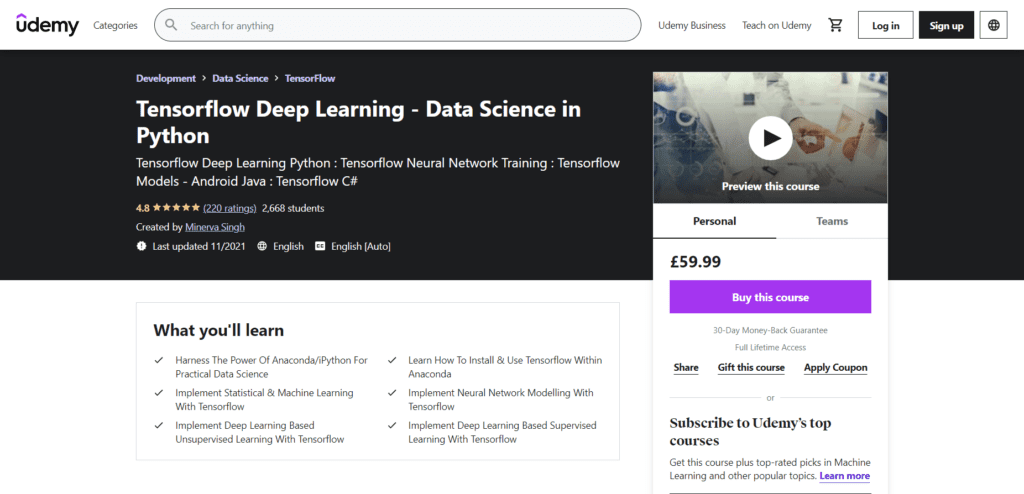
In this TensorFlow training course you will learn how to:
- Utlize the power of Anaconda/iPython for practical data science
- Install and use Tensorflow within Anaconda
- Implement statistical and Machine Learning with Tensorflow
- Implement Neural Network Modelling with Tensorflow
- Implement Deep Learning based unsupervised learning with Tensorflow
- Implement Deep Learning based supervised learning with Tensorflow
This 7 hour TensorFlow training course has ten modules and 70 lectures, which include:
1. Introduction to TensorFlow: the key concepts and software tools
- Data and Scripts For the Course
- What is Artificial Intelligence?
- Python Data Science Environment
- For Mac Users
- Introduction to IPython
- IPython in Browser
- Install TensorFlow
- Written TensorFlow Installation Instructions
2. Introduction to TensorFlow
- Computational Graphs
- Common Mathematical Operators in TensorFlow
- A TensorFlow Session
- Interactive TensorFlow Session
- Constants and Variables in TensorFlow
- Placeholders in TensorFlow
- TensorBoard: Visualize Graphs in TensorFlow
- Access TensorBoard Graphs
3. Other Python packages and there interaction with TensorFlow
- Miscellaneous Python Packages for Data Science
- Introduction to Numpy
- Create Numpy Arrays
- Numpy Operations
- Numpy for Statistical Operation
- Introduction to Pandas
- Read in Data from CSV
- Read in Excel Data
- Basic Data Cleaning
- Convert to Tensor Objects
4. Statistical Modelling with TensorFlow
- Correlation Analysis
- Linear Regression-Theory
- Linear Regression (From First Principles) With TensorFlow
- Visualize the Results of OLS
- Multiple Regression With TensorFlow – Part 1
- Multiple Regression With TensorFlow – Machine Learning Approach
- Estimate With TensorFlow Estimators
- Multiple Regression With TensorFlow Estimators
- More on Linear Regressor Estimator
- GLM: Generalized Linear Model
- Linear Classifier For Binary Classification
- Accuracy Assessment For Binary Classification
- Linear Classification with Binary Classification With Mixed Predictors
5. Introduction to Machine Learning
- Introduction
- What is Machine Learning?
6. Unsupervised Learning
- What is Unsupervised Learning?
- K-Means Clustering: Theory
- Implement K-Means on Real Data
7. Supervised Learning
- Softmax Classification
- Random Forest (RF) for Binary Classification
- Random Forest (RF) for Multiclass Classification
- kNN- Classification
8. Artificial Neural Networks and Deep Learning with TensorFlow
- Introduction to Artificial Neural Networks (ANN)
- Multi Layer Perceptron (MLP)
- Deep Neural Network (DNN) Classifier
- Deep Neural Network (DNN) Classifier With Mixed Predictors
- Deep Neural Network (DNN) Regression
- Wide and Deep Learning
- Autoencoders Theory
- Autoencoders for Credit Card Fraud Detection
- Autoencoders for Multiple Classes
9. Convolution Neural Network (CNN) for Image Analysis
- Introduction to Convolutional Neural Network (CNN)
- Implement a CNN for Multi-Class Supervised Classification
- Activation Functions
- More on Convolutional Neural Network (CNN)
- Pre-Requisite For Working With Imagery Data
- CNN on Image Data
- More on TFLearn
- Autoencoders with Convolutional Neural Network (CNN)
10. Miscellaneous Section
- Use Colabs for Jupyter Data Science
- Introduction To Github
Pros:
- The course includes 45 downloadable resources, 3 articles and a Certificate of completion
- Access on mobile and TV
- This course covers all the aspects of practical data science with the Tensorflow framework (Google’s powerful Deep Learning framework) in Python
- Students without a prior Python and / or statistics background will progress from a basic level to performing some of the most common advanced data science techniques using the powerful Python based Jupyter notebooks
- It is a practical, hands on course and you can apply concepts to your own projects
- You will gain skills in using packages like Numpy, Pandas, and Matplotlib and deep learning models such as Convolution Neural network
- Content is well organized
- You can learn flexibly with no deadlines
- There is a 30-day money back guarantee
- Smartphone apps are provided for Android and iOS
- Very high ratings given in the course reviews with people commenting that the instructor has impressive knowledge and presentation skills and the course has an excellent practical application to real life projects
Cons:
- Some reviewers commented that the instructor does too much reading and does not explain concepts enough
- There are limited support options
- Udemy is not an accredited institution
- Udemy’s “Certificate of Completion,” is not accredited
Price:
$16.79 or £14.99
7. Introduction to TensorFlow
Best TensorFlow Course for Beginners
Level: Beginner
This is my top pick for best TensorFlow course for beginners because it is a course by Google Cloud, providing an introduction to TensorFlow, which can be completed in 3 hours and 30 seconds and which you can easily complete for free under Pluralsight’s generous 10-day free trial.
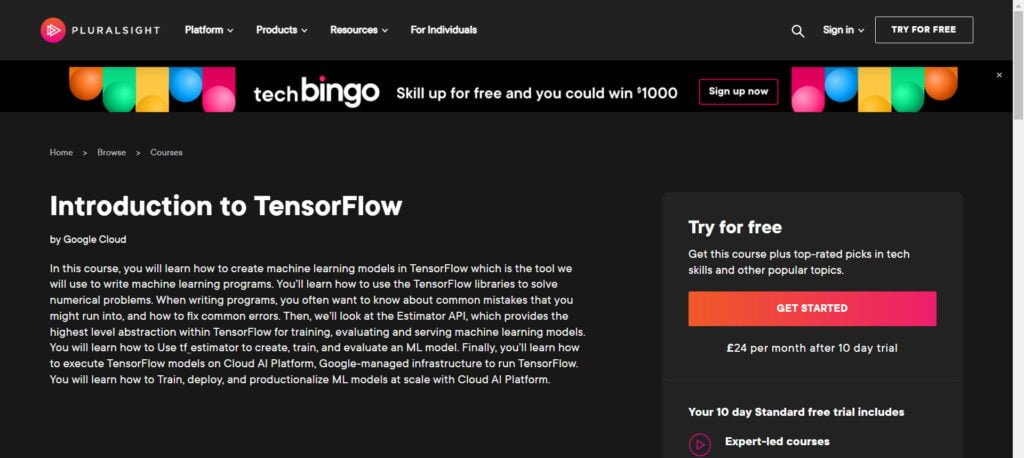
In this TensorFlow training course you will learn:
- How to create machine learning models in TensorFlow
- How to use the TensorFlow libraries to solve numerical problems.
- About common mistakes that you might run into, and how to fix common errors when writing programs.
- Explore the Estimator API, which provides the highest-level abstraction within TensorFlow for training, evaluating and serving machine learning models.
- How to Use tf_estimator to create, train, and evaluate an ML model.
- How to execute TensorFlow models on Cloud AI Platform, Google-managed infrastructure to run TensorFlow.
- How to Train, deploy, and mass-produce ML models at scale with Cloud AI Platform.
This online course covers:
- Core TensorFlow
- Estimator API
- Scaling TensorFlow models with Cloud AI Platform
Pros:
- It can easily be completed for free under Pluralsight’s 10-day free trial
- It is an excellent course for beginners
- It can be completed in just over 3 hours but is more comprehensive than some of the 1–2-hour courses offered
- It is a course by Google Cloud
Cons:
- You do not achieve a certificate
- It is less comprehensive than some courses offered
You can get started now with Pluralsight’s 10-day free trial! In fact, you can even complete the TensorFlow training during the trial period, so if you want to begin learning TensorFlow, I strongly recommend you enroll in this online course, as it is one of the best TensorFlow courses!
8. Building Machine Learning Solutions with TensorFlow 2.0
Best TensorFlow Course for Learning Paths
Level: Learning Pathway moving from Beginner, to Intermediate, to Advanced
Pluralsight’s Learning Paths combine specific courses and tools into one experience to teach you any given skill from start to finish. Learning Paths are aligned to your knowledge level, to help you develop the right skills in the right order.
The Building Machine Learning Solutions with TensorFlow 2.0 offered by Pluralsight will help you to learn how to use and build machine learning solutions with TensorFlow 2.0. It is my top pick for best TensorFlow course for learning paths.
Google released TensorFlow 2.0 in October 2019, which uses the dynamic graph and is more Python friendly. There are multiple changes to ensure the removal of redundant APIs and better integration with Python runtime and Eager Execution. There are 5 courses in this Learning Path, moving from Beginner, to Intermediate to Advanced for a total of 13 hours of learning. It is an excellent machine learning course with a focus on TensorFlow 2.0.
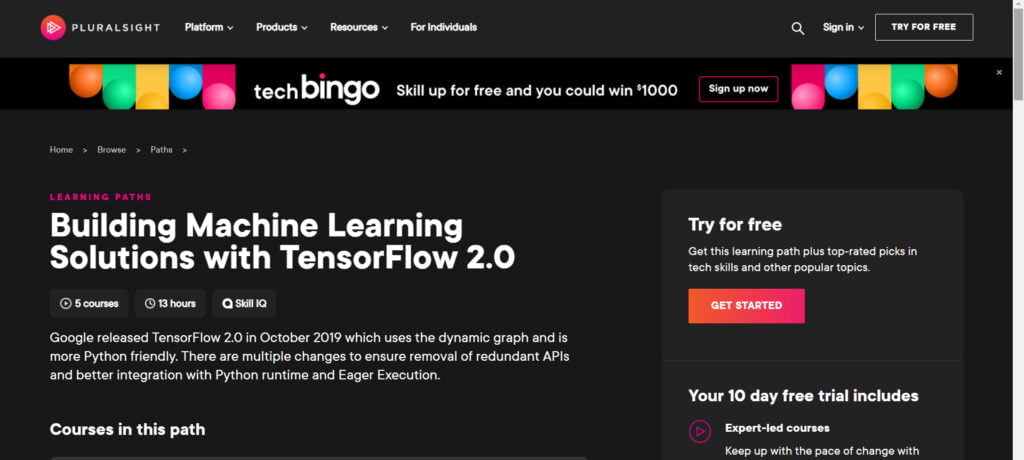
In this Learning Path, you will learn:
- How to design and implement machine learning solutions using TensorFlow 2.0
- How to design optimal Data pipelines
- How to apply TensorFlow to more advanced problems spaces, such as image recognition, language modeling, and predictive analytics
The courses in this Learning Pathway include:
Beginner Course
Learn everything you need to know to get started with TensorFlow 2.0.
- Getting Started with TensorFlow 2.0 by Janani Ravi (3h 9m)
Intermediate Courses
Step up your TensorFlow understanding by learning how to design data pipelines and implement hyperparameter tuning for TensorFlow 2.0.
2. Designing Data Pipelines with TensorFlow 2.0 by Chase DeHan (1h 53m)
3. Building Machine Learning Solutions with TensorFlow.js by Abhishek Kumar (4h 7m)
Advanced Courses
Learn how to build a machine learning workflow with Keras and work with time series data to generate high performing forecasts and predictions.
4. Build a Machine Learning Workflow with Keras TensorFlow 2.0 by Janani Ravi (3h 15m)
5. Implement Time Series Analysis, Forecasting and Prediction with TensorFlow 2.0 by Chase DeHan (1h 5m)
Pros:
- You can learn how to build machine learning solutions with TensorFlow 2.0 from start to finish or from beginner to advanced in one learning pathway.
- This Learning Path is aligned to your knowledge level, to help you develop the right skills in the right order.
- It can be completed for free under Pluralsight’s 10 day free trial, as the course is 13 hours long.
- A 100% online course
- You can start instantly and learn at your own pace.
- You can learn flexibly in accordance with the time you have.
- The course is taught by experts
Cons:
- The final course on the Learning Path has a 2-star review / rating average and you can’t click on the reviews to read them
- The course could be more in depth
Note: An alternative or additional course that could be considered in the Learning Paths series is Building Machine Learning Solutions with TensorFlow. There are 11 courses in this Learning Path, moving from Beginner, to Intermediate to Advanced for a total of 28 hours of learning!
You can get started now with Pluralsight’s 10-day free trial! In fact, you can even complete the TensorFlow training during the trial period, so if you want to begin learning TensorFlow 2.0, I strongly recommend you enroll in this machine learning course, as it is one of the best TensorFlow courses!
This is my roundup of the Best TensorFlow Courses. I would like to wish you much success in your course and career! I would love to hear from you how you got on with your course and career.
If you would like to learn more about the best future careers, read my blog article ‘22 Best Future Careers: In-demand Occupations for 2025-2075‘
If you are preparing for an interview, read my read my interview tips and the best questions to ask at an interview



